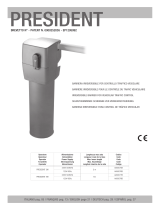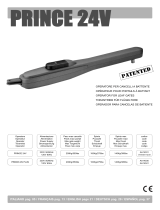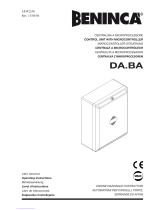La página se está cargando...

PRESIDENT

2
2
I F

3
3
G
B
D

4
4
E
S

5
5
I

6
6
I
TIPO DI COMANDO USO DELLA CHIUSURA
Personeesperte Personeesperte Usoillimitato
(fuoridaareapubblica*) (areapubblica)
auomopresente A B
aimpulsiinvista(es.sensore) C C CeD
aimpulsinoninvista(es.telecomando) C CeD CeD
automatico CeD CeD CeD
*esempiotipicosonolechiusurechenonaccedonoallapubblicavia.
A:Pulsantedicomandoauomopresente(cioèadazionemantenuta),comecod.ACG2020
B:Selettoreachiaveauomopresente,comecod.ACG1010
C:Encoderincorporato(infunzionedidispositivodilimitazionedelleforzeentroilimitidellanorma
EN12453-AppendiceA).
D:Encoderincorporato(infunzionedirilevatoredipresenza)
Componenti da installare secondo la norma EN12453

7
7
regmolle4m
I

8
8
I

9
9
I

10
10
I

11
11
I
D5
D4
D3
D2

12
12
I

13
13
I

14
14
F

15
15
F
TYPE DE COMMANDE USAGE DE LA FERMETURE
Personnesexpertes Personnesexpertes Usageillimité
(audehorsd’unezonepublique*)
(zonepublique)
àpressionmaintenue(Hommemort) A B
àimpulsionsàvue(ex.Détecteur) C C CetD
àimpulsionsnonàvue(ex.télécommande) C CetD CetD
automatique CetD CetD CetD
*l’exempletypiquesontlesfermeturesquin’accèdentpasàuncheminpublic.
A:Touchedecommandeàhommepresent(àactionmaintenue),codeACG2020.
B:Sélecteuràclefavechommeprésent,codeACG1010.
C:Encodeurincorporé(enfonctiondudispositifdelimitationdesforcesdansleslimitesdelanorme
EN12453-AppendiceA).
D:Encodeurincorporé(enfonctiondureleveurdeprésence).
Composants à installer selon la norme EN12453

16
16
regmolle4m
F

17
17
F

18
18
F

19
19
F

20
20
F
D5
D4
D3
D2

21
21
F

22
22
F

23
23
G
B

24
24
G
B
COMMAND TYPE USE OF THE BARRIER
Skilledpersons Skilledpersons Unrestricteduse
(outofapublicarea*) (publicarea)
withmannedoperation A B
withvisibleimpulses(e.g.sensor) C C CandD
withnotvisibleimpulses(e.g.remotecontroldevice)
C CandD CandD
automatic CandD CandD CandD
*atypicalexamplearethoseshutterswhichdonothaveaccesstoanypublicway.
A:Command button with manned operation (that is, operating as long as activated), like code
ACG2020.
B:Keyselectorwithmannedoperation,likecodeACG1010.
C:Built-in Encoder (operating as thrust limitation device, within the limits indicated by specification
EN12453-AppendixA).
D:Built-inEncoder(operatingaspresencedetector).
Components to install according to EN12453 standards
Power supply
Power supply

25
25
regmolle4m
G
B

26
26
G
B

27
27
G
B

28
28
G
B

29
29
G
B
D5
D4
D3
D2

30
30
G
B

31
31
G
B

32
32
D

33
33
STEUERUNGSSYSTEM ANWENDUNG DER SCHLIESSUNG
Fachpersonen Fachpersonen Grenzlose
(außereinemöffentlichenPlatz*) (öffentlicherPlatz)
Anwendung
mitTotmannschaltung A B
mitsichtbarenImpulsen
(z.B.Sensor)
C C CundD
mitnichtsichtbarenImpulsen
(z.B.Fernsender)
C CundD CundD
automatisch CundD CundD CundD
*einMusterbeispieldafürsindjeneTüre,diekeineZufahrtzueinemöffentlichenWeghaben.
A:BetriebstastemitTotmannschaltung(dasheißt,aktivierensieeineFunktion,solangemansie
gedrückthält),wieKodeACG2020.
B:SchlüsselselektormitTotmannschaltung,wieKodeACG1010.
C:EingebauterEncoder(fungiertalsEinrichtungzurEinschränkungderauswirkendenKräftenach
NormEN12453-AnhangA).
D:EingebauterEncoder(alsHindernis-Melder).
Komponenten zur Installation nach der Norm EN1253
D
Stromspannung und frequenz
Stromspannung und frequenz

34
34
regmolle4m
D

35
35
D

36
36
D

37
37
D

38
38
D
D5
D4
D3
D2

39
39
D

40
40
D

41
41
E
S

42
42
E
S
TIPO DE MANDO USO DEL CIERRE
PersonasexpertasPersonasexpertasUsoilimitado
(fueradeunáreapública*) (áreapública)
Enpresenciadealguien A B
Conimpulsosalavista(Ej.sensor) C C CeD
Conimpulsosnoalavista(Ej.telemando) C CeD CeD
automatico CeD CeD CeD
*unejemplotípicosonloscierresquenodanalacalle.
A:Pulsadordemandoenpresenciadealguien,(esdecirconacciónmantenida),comocód.
ACG2020.
B:Interruptordellaveenpresenciadealguien,comocód.ACG1010.
C:Encoderincorporado(enfuncióndedispositivodelimitacióndelasfuerzasdentrodeloslimitesde
lanormaEN12453-ApéndiceA).
D:Encoderincorporado(enfunciónderelevadordepresencia).
Componentes a instalar según la norma EN12453

43
43
regmolle4m
E
S

44
44
E
S

45
45
E
S

46
46
E
S

47
47
E
S
D5
D4
D3
D2

48
48
E
S

49
49
E
S

50
50
PRESIDENT 3 m
CAL1211
DDMM10I
DRL10X20Z
CCA1281
CME2148
DDD12MA
CCA1288
CME2147
DRL12X24Z
DDMM12Z
CCA1540
CAL1204
DTB10X40
CCA1284
CAL1207
CVA1182
DTB6X20I
CAL1205
CCA1286
CME5189
CEL1522
CME2146
MEC6004
DTB6X50
CVA1576
CME2149
CMO1331
CAL1201
CZM6304
DTB55X40
CAL1202
CCA1280
CME2145
CTC1357
DST12X20
CEL1351
CAL1208
CTC1358
BC07061
CCA1283
DTB5X25
CCA1282
CTC1284
CCA1289
CAC1459
CTC1163
DSB10X25
DDMM6Z
CME2144
CAL1210
CCM6205
CTC1420
CTC1126
CTC1309
CZZ6007ZZ
CTC1282
CME2143
CEL1520
CTC1123
CME2142
DAE63X65
CEL1533
CTC1084
CAC1458
CAC1457
BA10095
BA01059
BA50075B
CME2172
CCA1285
DTE8X80
DRL8X17
CCA1389
CME2171
MEC6004
CZZ6007ZZ
DAE55X16
DAE63X65
DBO10X25Z
DDD12MA
DDMM10I
DDMM12Z
DDMM3Z
DDMM6Z
DRL10X20Z
DRL12X24Z
DRL4X12Z
DRL8X17
DSB10X25
DST12x20
DTB10X40
DTB55X40
DTB5X25
DTB6X16
DTB6X20I
DTB6X50
DTB8X20
DTC3X12Z
DTC3X16
DTE6X12
Cusc.12JBL 6004 ZZ ME
Cusc. 6007ZZ
Vite aut.TE. 5.5X16 P.Tronca Z
Vite aut.TE. 6,3X65 UNI 7323/3
Vite testa bottone 10x25 UNI 7380
Dado autob. 12MA
Dado 10MA medio INOX UNI 5588
Dado 12MA medio UNI 5588
Dado 3MA medio UNI 5588
Dado 6MA medio UNI 5588
Rond. Piana 10X20
Rond. Piana 12X24
Rond. Piana 4X12
Rond. Piana 8.4X17X1.6
Vite TSPEI 10X25 UNI 5933
Grano M12X20 UNI 5923
Vite TCEI 10X40 UNI 5931
Vite TCEI 5,5X38 autof. zinc.
Vite TCEI 5X25 UNI 5931
Vite TCEI 6X16 UNI 5931
Vite TCEI 6X20 UNI 5931 inox
Vite TCEI 6X50 UNI5931
Vite TCEI 8X20 UNI 5931
Vite TC.CR. 3X12 zinc.
Vite TC.CR. 3X16 UNI 7687
Vite TE 6X12 UNI 5739
Codice Denominazione Particolare
BA01059
BA10095
BA50075B
BC07061
CAC1457
CAC1458
CAC1459
CAL1201
CAL1202
CAL1204
CAL1205
CAL1207
CAL1208
CAL1210
CAL1211
CCA1280
CCA1281
CCA1282
CCA1283
CCA1284
CCA1285
CCA1286
CCA1288
CCA1289
CCA1389
CCA1540
CCM6205
CEL1351
CEL1427
CEL1428
CEL1467
CEL1474
Serie access. cilind. PRESIDENT
Coppia molle PRESIDENT
Testa completa
Scheda PARK 24V per PRESIDENT
Profilo asta Ø 60
Profilo asta Ø 55
Profilo asta Ø 50 x PRESIDENT 3 m
Flangia fissaggio riduttore
Supporto unico
Giunto traino molle
Flangia Traino Molle
Carter asta
Sportello
Guscio sinistro
Guscio centrale
Staffa micro
Piastra fissaggio guscio
Guida cerniera
Staffa cerniera
Chiusura carter
Cavallotto per asta
Piastra fermo meccanico
Piastra Base
Colonna
Piastra porta asta
Tirante per piastra interr.
Cusc. mot. 6205ZZ 25 52 15
Microswitch a rotella
Fusibile 5x20 1,6A ritardato
Cap. occh. 5055 T OT stag. crimp.
Fascetta L 98x 2,5
Gruppo Finecorsa sic.
CEL1475
CEL1520
CEL1522
CEL1533
CME2140
CME2142
CME2143
CME2144
CME2145
CME2146
CME2147
CME2148
CME2149
CME2171
CME2172
CME5189
CMO1331
CTC1084
CTC1123
CTC1126
CTC1163
CTC1217
CTC1282
CTC1284
CTC1309
CTC1357
CTC1358
CTC1420
CVA1182
CVA1574
CVA1576
CZM6304
Cavetto terra
Supp. a sella x fascette 5499
Morsettiera portaf. OK133/2
Trasf.tor.130VA P230-S18
Perno per cerniera
Corona elicoidale
Innesto Sblocco
Perno sblocco
Inserto filettato
Vite senza fine
Bussola Piastra Base
Tirante Colonna
Pattino antiusura per molle
Albero traino brocciato
Mozzo per asta albero brocciato
Guida omega per PRESIDENT
Motorid. PRESIDENT 3/4m 24 VDC
Anello di tenua OR106
Seeger E25
Seeger E35
Spina elastica 6 40
Spina elastica 8 45
Spina cil. 6X20 non temprata
Spina elastica 5 10
Rondella spessoramento Ø35x45
Seeger I 13
Seeger E18
Molla sblocco
Capp. copriv. 039 0006 220 03
Tappo chiusura asta Ø 50
Tappo asta Ø 50 x PRESIDENT 3 m
Cusc. mot. 6304ZZ 20X52X15
Codice Denominazione Particolare
Codice Denominazione Particolare

51
51
PRESIDENT 4 m
DDMM10I
DRL10X20Z
CCA1281
CME2148
DDD12MA
CCA1288
CME2147
DRL12X24Z
DDMM12Z
CCA1540
CCA1289
CAC1466
CAC1465
CTC1163
DSB10X25
DDMM6Z
CAC1458
CAC1457
DTB10X40
CCA1284
CAL1207
CVA1182
DTB6X20I
CME5189
CEL1522
CME2146
MEC6004
CMO1331
CAL1201
CZM6304
DTB55X40
CAL1202
CCA1280
CME2145
CTC1357
DST12X20
CEL1351
CAL1208
CTC1358
BC07061
CCA1283
DTB5X25
CCA1282
CTC1284
CME2144
CAL1210
CCM6205
CTC1420
CTC1126
CTC1309
CZZ6007ZZ
CTC1282
CME2143
CEL1520
CTC1123
CME2142
DAE63X65
CEL1533
CTC1084
BA10095
BA01059
BA50077B
CME2171
CAL1205
CME2172
CCA1285
DTE8X80
DRL8X17
CCA1389
CME2149
DTB6X50
CVA1576
CME2158
CME5209
CTC1126
MEC6004
CZZ6007ZZ
DAE55X16
DAE63X65
DBO10X25Z
DDD12MA
DDMM10I
DDMM12Z
DDMM3Z
DDMM6Z
DRL10X20Z
DRL12X24Z
DRL4X12Z
DRL8X17
DSB10X25
DST12x20
DTB10X40
DTB55X40
DTB5X25
DTB6X16
DTB6X20I
DTB6X50
DTB8X20
DTC3X12Z
DTC3X16
DTE6X12
Cusc.12JBL 6004 ZZ ME
Cusc. 6007ZZ
Vite aut.TE. 5.5X16 P.Tronca Z
Vite aut.TE. 6,3X65 UNI 7323/3
Vite testa bottone 10x25 UNI 7380
Dado autob. 12MA
Dado 10MA medio INOX UNI 5588
Dado 12MA medio UNI 5588
Dado 3MA medio UNI 5588
Dado 6MA medio UNI 5588
Rond. Piana 10X20
Rond. Piana 12X24
Rond. Piana4X12
Rond. Piana 8.4X17X1.6
Vite TSPEI 10X25 UNI 5933
Grano M12X20 UNI 5923
Vite TCEI 10X40 UNI 5931
Vite TCEI 5,5X38 AUTOF. ZINC.
Vite TCEI 5X25 UNI 5931
Vite TCEI 6X16 UNI 5931
Vite TCEI 6X20 UNI 5931 INOX
Vite TCEI 6X50 UNI5931
Vite TCEI 8X20 UNI 5931
Vite TC.CR. 3X12 ZINC.
Vite TC.CR. 3X16 UNI 7687
Vite TE 6X12 UNI 5739
Codice Denominazione Particolare
BA01059
BA10095
BA50077B
BC07061
CAC1457
CAC1458
CAC1465
CAC1466
CAL1201
CAL1202
CAL1205
CAL1207
CAL1208
CAL1210
CCA1280
CCA1281
CCA1282
CCA1283
CCA1284
CCA1285
CCA1288
CCA1289
CCA1389
CCA1540
CCM6205
CEL1351
CEL1427
CEL1428
CEL1467
CEL1474
CEL1475
CEL1520
Serie access. cilind. PRESIDENT
Coppia molle PRESIDENT
Testa completa
Scheda PARK 24V per PRESIDENT
Profilo asta Ø 60
Profilo asta Ø 55
Profilo asta Ø 45 x PRESIDENT 4 m
Profilo asta Ø 50 x PRESIDENT 4 m
Flangia fissaggio riduttore
Supporto unico
Flangia Traino Molle
Carter asta
Sportello
Guscio sinistro
Staffa micro
Piastra fissaggio guscio
Guida cerniera
Staffa cerniera
Chiusura carter
Cavallotto per asta
Piastra Base
Colonna
Piastra porta asta
Tirante per piastra interr.
Cusc. mot. 6205ZZ 25 52 15
Microswitch a rotella
Fusibile 5x20 1,6A ritardato
Cap. occh. 5055 T OT stag. crimp.
Fascetta L 98x 2,5
Gruppo Finecorsa sic.
Cavetto terra
Supp. a sella x fascette 5499
CEL1522
CEL1533
CME2140
CME2142
CME2143
CME2144
CME2145
CME2146
CME2147
CME2148
CME2149
CME2158
CME2171
CME2172
CME5189
CME5209
CMO1331
CTC1084
CTC1123
CTC1126
CTC1163
CTC1217
CTC1282
CTC1284
CTC1309
CTC1357
CTC1358
CTC1420
CVA1182
CVA1574
CVA1850
CZM6304
Morsettiera portaf. OK133/2
Trasf. tor.130VA P230-S18
Perno per cerniera
Corona elicoidale
Innesto Sblocco
Perno sblocco
Inserto filettato
Vite senza fine
Bussola Piastra Base
Tirante Colonna
Pattino antiusura per molle
Guscio centrale
Albero traino brocciato
Mozzo per asta albero brocciato
Guida omega per PRESIDENT
Giunto traino molle
Motorid. PRESIDENT 3/4m 24 VDC
Anello di tenua OR106
Seeger E25
Seeger E35
Spina elastica 6 40
Spina elastica 8 45
Spina CIL. 6X20 non temprata
Spina elastica 5 10
Rondella spessoramento Ø35x45
Seeger I 13
Seeger E18
Molla sblocco
Capp.copriv.039 0006 220 03
Tappo chiusura asta Ø 50
Tappo asta Ø 45 x PRESIDENT 4 m
Cusc. mot. 6304ZZ 20X52X15
Codice Denominazione Particolare Codice Denominazione Particolare

Cod. CVA1603 - 24102012 - Rev. 21
DICHIARAZIONE DI CONFORMITÁ - DECLARATION OF COMPLIANCE
DÉCLARATION DE CONFORMITÉ - ÜBEREINSTIMMNUGSERKLÄRUNG
DECLARACIÓN DE CONFORMIDAD
Dichiariamo sotto la nostra responsabilità che l’operatore PRESIDENT è conforme alle seguenti norme e Direttive:
L’opérateur PRESIDENT se conforme aux normes suivantes:
We declare under our responsibility that PRESIDENT operator is conform to the following standards:
Wir erklaeren das der PRESIDENT den folgenden EN-Normen entspricht:
Declaramos, bajo nuestra responsabilidad que el operador PRESIDENT es conforme a la siguientes normas y disposiciones
Come richiesto dalle seguenti Direttive - Comme demandé par les suivantes Directives
As requested by the following Directives - Gemaß den folgenden Richtlinien - Tal y como requerido por las siguientes Disposiciones:
Il presente prodotto non può funzionare in modo indipendente ed è destinato ad essere incorporato in un impianto costituito da ulteriori elementi. Rientra perciò
nell’Art. 6 paragrafo 2 della Direttiva 2006/42/CE (Macchine) e successive modifiche, per cui segnaliamo il divieto di messa in servizio prima che l’impianto sia
stato dichiarato conforme alle disposizioni della Direttiva.
Le présent dispositif ne peut fonctionner de manière indépendante, étant prévu pour être intégré à une installation constituée d’autres éléments. Aussi rentre-t-il dans
le champ d’application de l’art. 6, paragraphe 2 de la Directive machines 2006/42/CEE et de ses modifications successives. Sa mise en service est interdite avant
que l’installation ait été déclarée conforme aux dispositions prévues par la Directive.
This product can not work alone and was designed to be fitted into a system made up of various other elements. Hence, it falls within Article 6, Paragraph 2 of the
EC-Directive 2006/42 (Machines) and following modifications, to which respect we point out the ban on its putting into service before being found compliant with
what is provided by the Directive.
Dieses Produkt kann nicht allein funktionieren und wurde konstruiert, um in einen von anderen Bestandteilen zusammengesetzten System eingebaut zu werden. Das
Produkt fällt deswegen unter Artikel 6, Paragraph 2 der EWG-Richtlinie 2006/42 (Maschinen) und folgenden.
Este producto no puede funcionar de manera independiente y se tiene que incorporar en una instalación compuesta por otros elementos. Está incluido por lo tanto en
el Art. 6 párrafo 2 de la Disposición 2006/42/CEE (Maquinaria) y sus siguientes modificaciones, por lo cual destacamos que está prohibido poner la instalación en
marcha antes de que esté declarada conforme a la citada Disposición.
Legal Representative
(Rasconi Antonio)
2006/95/CE 2004/108/CE 89/106/CE
EN 12604 2002
EN 12605 2001
EN 12453 2002
EN 12445 2002
EN 13241-1 2004
EN 55014-1 2000
EN 55014-2 1997
EN 60335-1 2008
EN 60335-2-103 2005
EN 61000-3-2 2007
EN 61000-3-3 1997
EN 61000-6-1 2007
EN 61000-6-2 2006
EN 61000-6-3 2007
EN 61000-6-4 2007
R.I.B. S.r.l.
25014 Castenedolo - Brescia - Italy
Via Matteotti, 162
Tel. ++39.030.2135811
Fax ++39.030.21358279 - 21358278
www.ribind.it - ribind@ribind.it
PRESIDENT
1/52





